Nexus: The Jupiter Incident
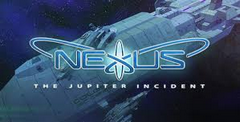
| a game by | HD Interactive |
| Platform: | PC (2004) |
| User Rating: | 6.0/10 - 2 votes |
| Rate this game: | |
| See also: | Best RTS Games, Space Games |
Several years ago I was turned onto the whole space strategy genre while sitting in the plush offices of then publishing powerhouse GT Interactive. Several journos had been invited to a presentation of a new game from Hungary (it was standing room only, I tell you) called Imperium Galactica. Due mainly to an extremely enthusiastic front man from developers Digital Reality and a classic DFS-based ad-lib from yours truly, the afternoon was an extremely pleasant one for all concerned and I left with great eagerness to try the game out for myself. Try it out I did, and I became thoroughly enamoured by the mixture of detailed storyline, space-based strategy and colonial resource management (so much so that for some reason it made me speak like Yoda for a while). The game proved a minor hit, spawned a similarly playable sequel, and then fell into the usual obscurity.
Until suddenly, like a bolt from the blue, it’s back, and looks set to give the likes of Homeworld and, er, all those other 3D space strategy games a real run for their money. On the face of it everything seems to have changed, not least the developers. Gone are Digital Reality (rumoured to be working on a brand new entry into the rapidly crowding genre) and in their place are fellow Hungarians, Philos Labs.
Rhyme And Reason
Despite the acquisition of the licence, Philos is keen to stress that IG3 is its own game, not just a rehash of the first two. "Frankly speaking, nothing has been kept from IG2," states lead designer Zsolt Hanula boldly. "We’ve been building everything from the base up. We’ve learnt that we should not cram too many things into a game, but rather that it’s better to concentrate only on one thing, which in our case is the tactical combat system.
Imagine a golden mean between Homewortd and Imperium Galactica II -that is going to be IG3," he adds. One thing that remains is the adherence to a strong plot, and it is this that drives your actions through the game. It was this feature that made the previous titles stand out from the rest of the genre, adding new depth to the usual fare of strategic combat and resource management. To help achieve something similar for this third incarnation, Philos enlisted the help of one of Hungary’s leading science fiction authors, Zsolt Nyulaszi (Zsolt apparently being the Hungarian equivalent of John or Dave). The story revolves around a group of refugee humans that fled the Earth when it was taken over by an alien force. While they try to build up enough of a fleet to reclaim their home they’ll encounter various alien races, which you are free to make or break alliances with, all of which affects the direction the story heads in.
"It depends on the attitude of the player," says Hanula. "If someone focuses on the missions and the story, then it will be a more linear gameplay, but with plot branches. Those who prefer strategy and empire-building will only experience the game’s beginning and end in terms of linearity. Instead of relying on the historic and technical characteristics of the previous two games, IG3 examines the underlying concept of the series."
Little Computer People
Despite that, one staple concept from the first two games has been done away with almost entirely - ground combat. Part of the uniqueness of the IG series was that combat didn’t just take place between space-faring behemoths. You could also beef up your planetary colonies with ground units such as tanks and infantry, repelling invasion forces and the like.
"There is no ground combat in the game this time," laments Hanula, "because we’ve decided to concentrate on the space battles. The ships’ weapons could destroy any planetary forces from orbit anyway," he adds, which is a good point. This doesn’t mean that planetary units are eliminated entirely. Colonisation is still a key part of the game, ensuring your fleet grows as the game progresses. You just won't be doing any fighting down there, that’s all. Colonies are developed according to the type of path you wish to explore. An emphasis on science over industry will result in newer technologies being developed quicker, at the expense of units to implement them. There’s one other aspect to colonies that plays an important part in the long run, namely the development of your citizens. Individual colonists who show outstanding performance may emerge in the long run as individual NPCs with specific abilities and skills, able to be used for special tasks throughout the game.
The Undiscovered Country
Of course, the main part of the game lies in seeing dozens of tower block-sized spaceships firing different coloured lasers at each other like a kind of twisted Jean-Michel Jarre concert. "You can control up to ten ships simultaneously and during the span of the story you will be able to gain between 20 and 30 altogether," says Hanula. The key to these large fleets is that you can customise your ships as you see fit. Not by hanging fuzzy dice on the rear-view monitors or putting 'Sharon & Gr’Thok Of The Dying Moon’ stickers across the top of the windscreens, but by tinkering with the hardware configurations. This can be as simple as adding extra armour plates to the front, or as complex as configuring certain types of weapons to different ships - all adding to the various tactics you can use in the middle of the visually stunning battles.
So a bit more depth than the usual strategic fare then. And a story-based approach that gives all the action a sense of purpose. Whether the new boys at Philos can match what went before is something we’ll only find out this spring, by which time it’ll probably be going up against Homeworld 2. Which should be the most interesting battle of all.
Download Nexus: The Jupiter Incident

System requirements:
- PC compatible
- Operating systems: Windows 10/Windows 8/Windows 7/2000/Vista/WinXP
Game Reviews
Nexus: The Jupiter Incident is not what it appears to be. At a glance it looks like just another rewed-up RTS spectacular, a quest for galactic domination across a galaxy ripe with familiar resources and bland alien races. However, it is in fact a lot more like a long-lost soulmate to the genre-defining Homeworld, with all the depth and tactical subtlety that entails. While it offers up plenty of visual excitement and follows a few familiar RTS guidelines, the structure and pace of the game has much more the feel of a captain's chair simulation of fleet combat. And what's more, it's very, very good.
The story, set exclusively in space, has you playing accidental war hero Marcus Cromwell, son of the equally famous leader of the ill-fated Noah's Ark expedition of the 21st century (come on, surely you remember?). Now in the year 2111, Cromwell Jr is in the employ of one the game's rather nefarious pan-galactic mega corporations, and is sent to investigate some strange goings-on around Jupiter way. The planet's big red eye and nearby monolith aside, it appears something wonderful might happen - and for the sake of gameplay it does, as aliens turn up causing all sorts of mischief in those sleek bio-metallic lilac spacecraft that aliens always seem to favour.
Woo-Hoo, We Got 'em
Although the story underpinning the game reveals the fate of Papa Cromwell and the hubris of human self-preservation and expansionism (ahem, sorry, wrong meeting), the gameplay itself is entirely motivated by battles. The promise of a handful of ships facing off across the heavens may appear small fry in comparison to Homeworld's hundreds, but combat in Nexus is far more tactical and involving than the usual drag-and-drop behaviour demanded in most strategy face-offs.
You see, it's all about getting your ships into the right positions to use short, medium or long-range weapons, and of course, to know when to hold back in order to undertake repairs or redistribute power and resources. Whereas in most RTS titles you always have the raw materials to build new units should you lose any, here the loss of a ship is a serious blow, sometimes catastrophic. Likewise, when the guns of a single enemy vessel fall silent and it drifts bereft of power in the depths of space you almost want to punch the air in celebration. You can't, obviously, since your bridge crew will think of you as unprofessional, but you want to nonetheless.
Stay On Target
Nexus is not a hectic game by any means. Like the archetypal grizzled ship's captain you need to be aware of the space around you and the position, speed and angle of attack of the enemy. Timing is important too; you need to know when to unleash raw firepower as opposed to dealing local system-specific damage. And as new weapons, crew and ships are added to your task force, the trade-off between micromanagement and the need to co-ordinate your fleet becomes a key consideration. All in all, there's no shortage of tension.
White it would be unfair to tag Nexus a 'hardcore' space game, it's not overly easy to get to grips with. The tutorial and early missions give some guidance, but there remains a feeling that the all-important area of strategy is glossed over somewhat. The interface is a fiddly beast, with all manner of icons, status displays and readouts to take in (should you feel the need to). However, once you've settled into the pace of the game, the control system actually works in your favour, giving you the tools to manage your fleet's power and weapon resources, and allowing you to control the battles rather than just react to them.
Graphically the game is impressive. Asteroid fields, nebulous clouds of debris and distant planets all add to the immersion, while arcing plasma trails linger impressively behind ships as they cut across the blackness of space. Admittedly, the spaceships do have a rather generic look to them, and it can be difficult to tell the difference between a vast battleship and a tiny frigate without referring to the side-panel, but this is a subjective niggle at best.
Sound quality is equally good, with an orchestral score that gives way to more tribal rhythms as the aliens are dragged into the game. There are suitably convincing voiceovers for the characters too, and it's very welcome to be able to play a game where the cast isn't forced to wear overwrought American accents.
Admittedly, there are some instances where the Al does a good job of convincing you it's stupid - enemy fleets follow scripted objectives a little too rigidly, for instance. Overall however, we're rather taken with Nexus. Its mixture of tactics, mouse-control and combat-orientated gameplay is suitably different from both Homeworld and traditional space-combat games like Freespace, delivering something unique and yet familiar enough to appeal to fans of either game. Which makes an old space buckaroo like me very happy indeed.
Coming by way of a publisher that likes to tweak its own name every year or so, it didn't seem such a preposterous rumour that Nexus was about to be given a(nother) new moniker. So the story went, VU Games (aka Vivendi, Sierra) was going to turn Nexus (aka Galaxy Andromeda, Imperium Galactica III) into the next Homeworld and, had it been true, a great many people would have become rather piqued with excitement.
Yet, despite the obvious similarities of the star-spangled setting and mouse-driven ship combat, the two games are quite distinct. Where Homeworld is very much a traditional RTS with resources to hoard and a base to build before combat can commence, Nexus concerns itself almost exclusively with fleet-level tactics.
Nexus also won't be offering battles anywhere near the same scale as Homeworld. However, while the number of ships under your command is considerably smaller, Nexus compensates by giving you a great deal of control over each of your vessels, not only in terms of what your ships can do, but how they do it. For instance, you can navigate simply by right-clicking on an object on the screen, or you can create a set of elaborate waypoints and send your ship barrelling in and out of enemy craft like some intergalactic Volvo on ice skates.
Combat isn't simply a case of targeting and tapping the fire key and waiting for the inevitable bang either. Heavy weapons, torpedoes and lighter weapons (used to knock out specific ship systems) all require you to operate at certain ranges. With up to ten other ships in your fleet, not to mention having to contend with repair queues, mine fields, fighters, spaces stations and weapons platforms, it can all get rather hectic. You may be in command of hulking great dreadnoughts but the pace of the game is anything but sluggish.
Ignition... Lift-Off?
Despite its turbulent and rather protracted development cycle (the original release date was back in 2001), the game still looks as impressive as it did four years ago, with ships arcing through asteroid fields and laser beams cutting through space. The prolonged building time has also ensured a solid product - even our pre-release version is remarkably stable and bug-free and clearly a lot of fine-tuning has been going on.
Whether or not the scale or scope of the combat will appeal to the masses is another matter, but if you've been waiting for or wanting something to take over where Homeworld 2 left off, Nexus could well be the game to lift space strategy into a higher orbit.
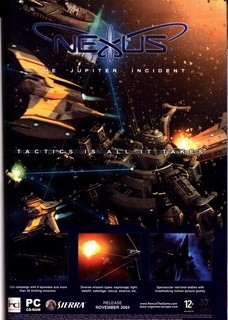
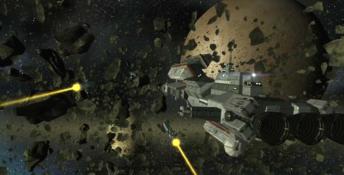
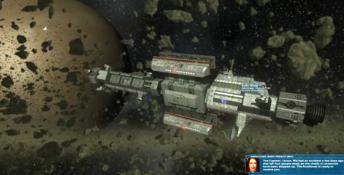
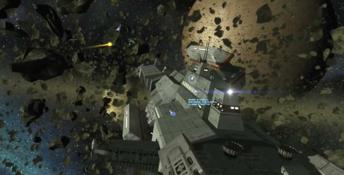

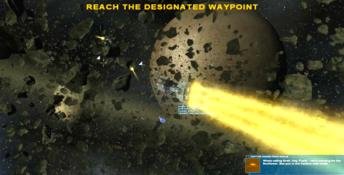
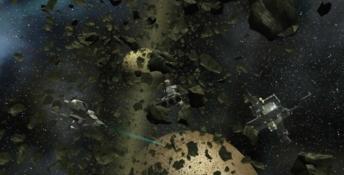
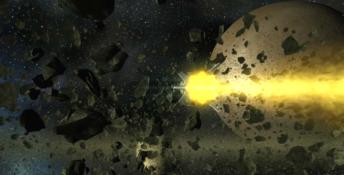
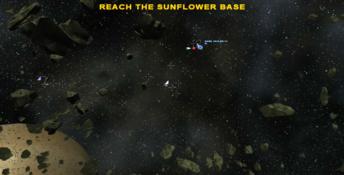

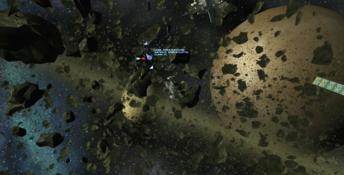
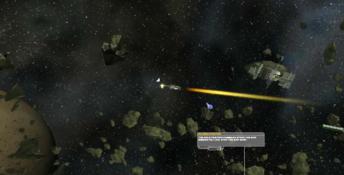
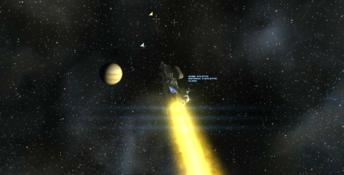
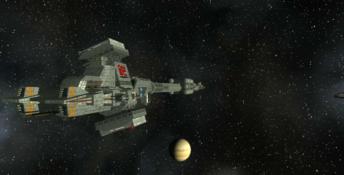
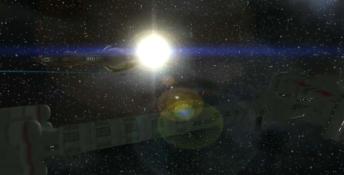
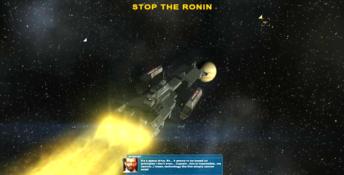

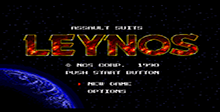 Assault Suits Leynoss
Assault Suits Leynoss
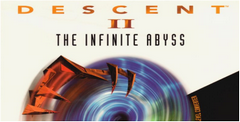 Descent 2
Descent 2
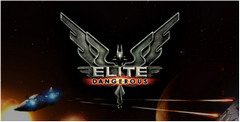 Elite Dangerous
Elite Dangerous
 Infestation
Infestation Into The Void
Into The Void
 Mass Effect
Mass Effect
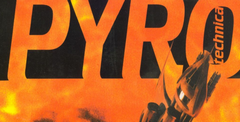 Pyrotechnica
Pyrotechnica
 SWIV 3D
SWIV 3D
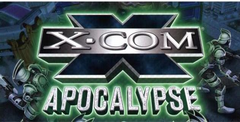 X-COM 3: Apocalypse
X-COM 3: Apocalypse